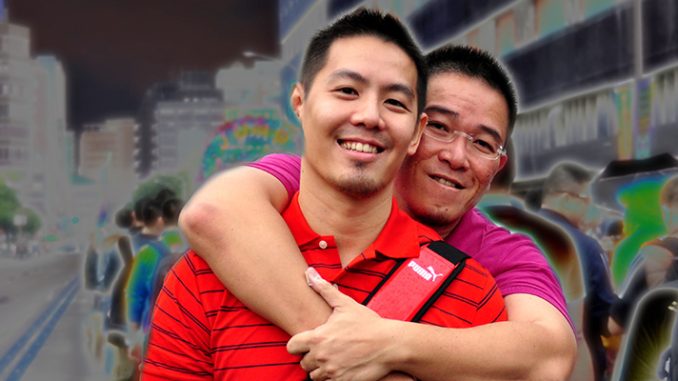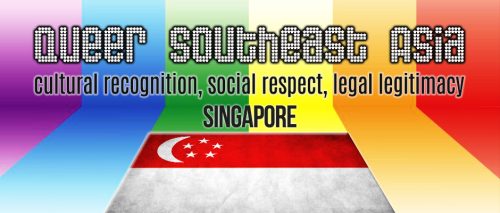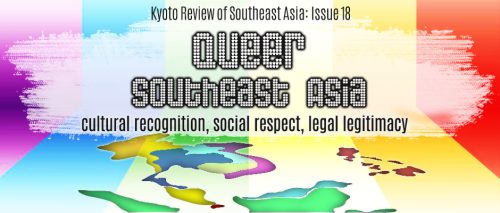
The legal activism from 2007 to 2015 forms the focus of this article. 1 This activism did not achieve decriminalisation, but did succeed in eliciting governmental and judicial positions on homosexuality, clarifying the challenges that lie ahead for queer activism in Singapore. Despite governmental statements that Section 377A is not “actively” enforced, the present legal intransigence over decriminalising homosexuality more broadly reflects political reluctance to protect minorities, on the supposed basis of deferring to conservative majoritarian will.
Legal Background
The British colonial government introduced Section 377A of the Penal Code into Singapore in 1938, modelling it on Section 11 of the United Kingdom Criminal Law Amendment Act of 1885 (Lee 1995; Chua 2003). This provision was enacted in only some of Britain’s former colonies. Unlike Section 377 on “carnal intercourse against the order of nature”, which is more commonly found in former British colonies whose penal statutes were also derived from the Indian Penal Code, Singapore’s Section 377A reads:
Any male person who, in public or private, commits, or abets the commission of, or procures or attempts to procure the commission by any male person of, any act of gross indecency with another male person, shall be punished with imprisonment for a term which may extend to 2 years.
The wording of Section 377A captures a broad range of conduct. The expression “gross indecency” is not defined in the statute, and according to case law and academic opinion it could include intimate physical contact not amounting to sexual intercourse as well as fellatio and anal sex. Section 377A is also not limited to public or non-consensual acts, meaning that it extends to private, consensual male homosexual relations.
Until Singapore’s Penal Code revisions in 2007 – discussed below – Section 377A existed alongside Section 377, with the latter stating:
Whoever has carnal intercourse against the order of nature with any man, woman or animals, shall be punished with imprisonment for life, or with imprisonment for a term which may extend to 10 years, and shall also be liable to fine.
Note that penetration is sufficient to constitute the carnal intercourse necessary to the offence described in Section 377. Like Section 377A, Section 377 also extended to private, consensual relations. Yet, it was simultaneously both narrower and broader, being limited to sexual acts involving penile penetration, such as oral and anal sex, but also covering conduct between men and between persons of the opposite sex.
In practice, both provisions were most frequently applied in cases involving non-consent or force, and minors. Since the mid-1990s, there has been little active policing of same-sex sexual relations, though police raids of gay venues still occur where illegal drug use is suspected to be involved. In the past, when the police used to entrap gay men at cruising sites, they would usually bring charges under Section 354 of the Penal Code, for “outrage [of] modesty” of the undercover officer. No equivalent of sections 377 or 377A exists against female homosexuality.
However, the social and political impact of the criminalisation of male homosexuality by virtue of Sections 377A and (until 2007) 377 goes beyond legal sanctions. These section have been used to justify the denial of legal status to a queer rights group, the banning of media broadcast content that “promotes,” “justifies” or “glamorises” “lifestyles such as homosexuality, lesbianism, bisexualism, transsexualism [and] transvestism,” as well as to prohibit any affirmative discussion of homosexuality in public school sex education programs (Chua 2014). The government has also acknowledged that Section 377A serves the purpose of symbolising the exclusion of homosexuality from “mainstream” Singaporean society.
The 2007 Parliamentary Petition
The government statement on Section 377A’s “symbolism” emerged during a 2007 campaign that petitioned the Singaporean parliament to repeal the law. Although queer activism in Singapore is traceable to the early 1990s, the 2007 campaign was the first time activists sought popular support and publicly demanded decriminalisation. It marked the beginning of legal activism that targeted Section 377A and culminated with the 2014 judgment noted above.
Impetus for the campaign stemmed from state-initiated amendments to the Penal Code. In November 2006, the Singaporean government announced a comprehensive review of statutes and solicited feedback through a public consultation exercise. Among proposed amendments was the repeal of Section 377. However, because Section 377A was to be retained, the proposed amendments rendered the criminalisation of sexual relations between men even more singular and acute.
Queer activists initially submitted objections to retaining Section 377A through the official consultation channels. However, after the consultation period, the government announced that it would still retain the provision, explaining that the majority of Singaporeans supported the current law, and so the government should “let the situation evolve” (Chua 2014).
In response, a group of queer activists decided to petition parliament for Section 377A’s repeal. Within two months, they amassed 2,519 signatures and, for the first time in the history of independent Singapore, submitted a petition with popular support to parliament. They did so knowing that the petition had little chance of altering the government’s position. Parliament was moving ahead with the passage of the Penal Code amendment bill, which excluded any changes to Section 377A, and in the single-party dominated legislature the bill was easily enacted.
Nonetheless, from the campaign queer activists gained a more sophisticated understanding of the Singaporean government and the opposition they faced. The petition elicited a parliamentary speech from the prime minister that crystallised the state’s position on homosexuality: queer people do have a place in Singaporean society, and Section 377A would not be enforced in consensual, private situations; but the will of the majority, who has yet to accept homosexuality, must prevail, and so the law has to remain as a symbol. The campaign also drew out queer activism’s most ferocious opposition made up of fundamentalist Christians. It revealed how the Christian right — despite being a minority of a minority religion in Singapore— was able to organize swiftly and advocate its views as supposedly being representative of the “majority of Singaporeans”.
The Cases of Tan Eng Hong and Lim Meng Suang
The 2007 parliamentary petition signaled that, for now, legal reform through the legislation would be foreclosed. Among queer activists, intermittent discussion took place about whether to pursue a judicial route to abolishing Section 377A. A key question was who would be the litigant, for this person’s personal life and sexuality would necessarily enter into public record, and he would do so knowing that the Singaporean judiciary lacks a record of upholding constitutional rights. Although the constitution provides that any laws inconsistent with it would be invalid, the judiciary has never found any law to be in violation of constitutionally protected rights. 2
Such discussions, however, were overtaken by an unexpected incident that sped queer activists toward the courts. On 2 September 2010, a man named Tan Eng Hong was charged under Section 377A for having oral sex with another man in the restroom of a shopping mall. Activists criticized the charge, pointing to the prime minister’s statement on non-enforcement. Without explanation, the Attorney General later substituted prosecution under Section 377A with a lesser charge of public obscenity. By this time, Tan’s attorney had initiated a separate lawsuit to challenge that Section 377A violated the right to equal protection under the law and the right to life and liberty under the Singaporean constitution. The Attorney General then moved to strike out this lawsuit on procedural grounds that Tan lacked legal standing – a requirement for somebody to bring a case – since he was no longer to be charged under Section 377A. Soon after, Tan pleaded guilty to the obscenity charge, and the lower courts agreed with the Attorney General and struck out the constitutional challenge. Tan appealed this decision to the Court of Appeal, Singapore’s final court of resort, which disagreed with the lower courts and ruled in Tan’s favour.

The August 2012 Court of Appeal decision concerned a procedural matter, holding that a gay citizen could indeed challenge Section 377A’s constitutionality without first having to be arrested or charged under it. It meant that Tan could proceed with the constitutional challenge, and other gay Singaporeans could also do the same. In November 2012, gay couple Lim Meng Suang and Kenneth Chee Mun-Leon filed their own separate case alongside Tan’s.
A group of queer activists supported Lim and Chee, although many were hesitant about Tan’s case. From their strategic viewpoint, Tan’s association with sex in a public toilet was not the ideal suit for queer advocacy. In contrast to Tan, Lim and Chee are corporate executives in a long-term, stable relationship and have no criminal record. Activists rallied around the couple to handle public relations, and organized a campaign on a crowd-sourcing website, raising more than U$100,000 for legal fees. 3
On February 14 and March 6, 2013, the cases of Lim Meng Suang and Tan Eng Hong were respectively heard in the High Court, the court of first instance for constitutional challenges. Justice Quentin Loh decided against both cases, ruling that courts should defer to the legislature on issues of morality, and, since parliament had decided to retain the law due to the majority’s “disapproval” of homosexuality, the courts could not intervene. Following common law tradition, Singapore’s lower courts have to follow previous decisions of the highest court, which had applied a conservative approach toward the constitutional provisions on the rights to equal protection and life and liberty.
Tan, Lim and Chee appealed to the Court of Appeal. Unlike the High Court, the Court of Appeal has the power to depart from its prior approaches. However, the three-judge panel affirmed Justice Loh’s decision, following the established legal test on the right to equal protection: the singling out of men who have same-sex relations caught by Section 377A was an “intelligible differentia” – a discernible category – and singling out this category of people bore a “rational nexus” to the purpose of the law, which was to curb sexual conduct between men. According to Justice Andrew Phang’s 100-page opinion, the judiciary should not go behind the purpose of the law to question parliament’s intention; hence, courts could not provide redress for the litigants.
News report on the story from Singapore’s Channel NewsAsia —
[youtube id=”n5dkrjjNWqE” align=”center” mode=”lazyload” maxwidth=”700″]
Conclusion
Lim Meng Suang and Tan Eng Hong represent the end of queer activism through the courts for the foreseeable future. Anybody bringing a similar case would have to contend with these judgments, which are binding upon lower courts on the same points of law. In short, the judgments indicated that any changes to Section 377A will have to be made by the legislature, the majoritarian institution. Unfortunately, it is uncertain whether Singapore’s parliament would be willing to do so, especially since the 2007 statements about the law’s symbolisation of “majority values”. This state of affairs was exactly why queer activists turned to the courts, which do have constitutional power to rule for the protection of minority rights. Yet, the courts pointed the activists back to the legislature. Dominated by a single party, the legislature could easily repeal Section 377A. However, in the face of fierce opposition from the religious right and the entrenched perceptions of their constituents, Singapore’s parliament will require not only moral conviction but also strong political motivation to stand up for the country’s queer populace.
Lynette J. Chua
National University of Singapore
Issue 18, Kyoto Review of Southeast Asia, September 2015
References
Chua, Lynette J. 2003. “Saying No: Sections 377 and 377A of the Penal Code.” Singapore Journal of Legal Studies 209–261.
—— 2014. Mobilizing Gay Singapore: Rights and Resistance in an Authoritarian State. Philadelphia: Temple University Press.
Lee, Jack Tsen-Ta. 1995. “Equal Protection and Sexual Orientation.” Singapore Law Review 16: 228-285.
Notes:
- For analysis of the forms of queer activism in Singapore, see Chua 2014. ↩
- Only one case has ever found the legislation in question to be unconstitutional, but the decision was ultimately overturned by the highest court. ↩
- Some in the local queer community criticized Lim Meng Suang activists for whitewashing their community by preferring litigants who are more respectable in the eyes of the rest of Singaporean society. The decision to organize Lim Meng Suang is complex and forms a separate study that I am conducting. ↩


